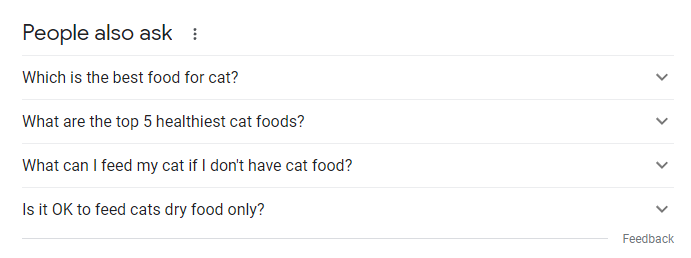Building topical authority should be prioritized by new niche websites looking to rank in Google in 2023. If you want the benefits of SEO, then you need to build topical authority in your niche.
What This Article Covers
- Free & Easy Way To Find Long Tail Keywords
- Using SE Ranking To Identify Which Keywords You Can Rank For
Free & Easy Way To Find Long Tail Keywords To Build Topical Authority
To get started, open up a web browser and head to Google.
Then, follow these steps:
- Type in a short search term related to your niche website.
- Scroll down to the “People Also Ask” section.
- Click the arrow twice to open and close one of these questions.
- As more questions load, continue until you have 10 or 20 questions.
- Paste these questions into Google Sheets.
- Sort these into related topics in separate tabs of the Sheets document.
- Write articles related to each topic cluster.
- Rinse & repeat.

Finding Which Keywords You Can Rank For
Once you have generated various lists of questions and topic clusters, you can go about writing these articles and interlinking them with one another.
Early in your website’s life, it is vital to simply cover topics regardless of their search volume, as building topical authority is the first step before you can try to generate organic search traffic.
If, though, you want to prioritize which keywords you can actually rank for in Google, then you can use a keyword tool like SE Ranking.
Use the following steps to identify which keywords are easier to rank your website for.
#1 – Keyword Search
First, head over to SE Ranking, select Keyword Research and type in a search term. You can try it yourself by clicking on the image below.
#2 – Sort By Search Difficulty
On the next page, click “View Detailed Report” under the “Keyword ideas” box.

Once you are on the results page of the keyword search, click on the “Difficulty” tab twice to sort from lowest competition to highest. Lower competition keywords will return a green circle with a number below 10.
These keywords are going to be easier to rank for in Google. This can be due to various factors, such as the SERP rankings featuring low authority websites, or when not many websites have targeted the keywords.

It is preferable to find low-competition keywords with some search traffic, but know that the search traffic listed in keyword tools is usually different from the actual search volume.
#3 – Check The Serps
Next, we want to look at the SERPs themselves to see what websites we will compete against.
A SERP is the search engine results page, which you see when you search for something in a search engine.
If you look at SERPs which list a bunch of giant high-authority websites, it will be hard for smaller websites to rank.
If instead you look at the SERPs and find that small blogs, forums, or Reddit are ranking for the term, the chances are high that you can rank for that search term.

Google wants to deliver high-quality, targeted information to people searching. When pages come up that are not dedicated to the topic, it is a sign that there is an opportunity for you to make great content and rank for that keyword.
In the case of the screenshot shown above, you can see that there are some pages with a low level of page trust, with zero backlinks ranking in Google for this term.
When you see keywords relevant to your niche website with SERPs like this, create content to target those search terms.
#4 – Create Engaging Content To Rank In Google
As I discussed in my article on Instagram reach, making articles that grab people’s attention and give them what they want is crucial for building websites to make money online.
If you want your article to get clicks and organic search traffic, make sure to utilize the following best practices:
- Use your main keyword and variations of the main keyword in your headings and paragraphs.
- Focus on writing content that helps the user solve their problem or answer their questions.
- Avoid over-optimizing the page with keyword stuffing. This makes users trust your site less and can hinder your ability to rank.
- Check competitor websites in the SERPs of your targeted keyword so you can work on writing better content than theirs.
You can use a tool like Surfer SEO to help automate this process of analyzing SERP competitors and find what keywords, word count, or headings they use in their articles.




Leave a Reply